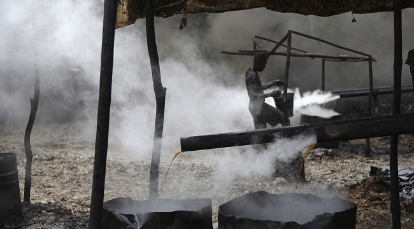
The Nigerian National Petroleum Company Limited (NNPCL) has announced the discovery and confiscation of products from 63 illegal refineries in the Niger Delta, amidst rising concerns over the delayed operational start of the Port Harcourt Refinery. This development comes as the refinery, under NNPCL’s management, has failed to commence operations after multiple postponements.
In a documentary released on Wednesday, NNPCL detailed its recent efforts in combating illegal refining and crude oil theft in the region. According to the company, 19 illegal pipeline connections and 63 unauthorized refineries were uncovered between August 3 and 9, 2024. The discoveries were made across several states, including Bayelsa, Rivers, Abia, Imo, and Delta, highlighting the pervasive issue of oil theft that continues to plague Nigeria’s oil industry.
The announcement comes at a time when the Port Harcourt Refinery, a key facility in Nigeria’s petroleum sector, remains non-operational despite promises from the NNPCL and the Federal Ministry of Petroleum Resources. The refinery was expected to begin production in early August 2024, as stated by NNPCL’s Group Chief Executive Officer, Mele Kyari, during a Senate appearance in July. This marked the latest in a series of commitments from the company, which previously assured that all four of Nigeria’s refineries would be operational by the end of former President Muhammadu Buhari’s administration.
Kyari had confidently projected that Nigeria would become a net exporter of petroleum products by the end of 2024, with the Port Harcourt Refinery leading the charge. However, as the month reaches its midpoint, the refinery remains idle, prompting concerns about another unfulfilled promise from the national oil company. NNPCL has yet to provide an explanation for the ongoing delays.
In an effort to underscore its commitment to securing Nigeria’s oil assets, NNPCL reported that 177 incidents of oil-related crimes were documented over the past week. These incidents were recorded by various entities, including Tantita Security Services, Shell Petroleum Development Company, and government security agencies. The company noted that significant progress was made in cracking down on illegal activities, with 17 arrests and the confiscation of 15 wooden boats used to transport stolen crude in Rivers and Bayelsa States.
Among the discoveries were a vandalized and barricaded oil wellhead in Bayelsa State and stolen crude oil hidden in reservoirs in Rivers State. NNPCL’s Command and Control Centre, along with other agencies, reported that 51 incidents occurred in deep blue waters, 21 in the western region, 29 in the central region, and 76 in the eastern region of the country.
The crackdown on illegal refineries comes at a crucial time for Nigeria, which is grappling with low crude oil production. The country’s output has fluctuated between 1.1 million barrels per day (mb/d) and 1.3 mb/d in recent years, significantly below its OPEC+ quota of 1.5 mb/d. According to the Organization of the Petroleum Exporting Countries’ (OPEC) Monthly Oil Market Report for August 2024, Nigeria’s production briefly rose to 1.3 mb/d in July, up from 1.2 mb/d in June, yet still falls short of its potential.
The ongoing issue of oil theft remains a significant challenge, with prominent figures like billionaire businessman Tony Elumelu calling on the government and security agencies to identify and hold accountable those responsible for the large-scale theft of crude oil. Elumelu, whose own operations have been severely impacted, noted that 18% of crude from his fields is stolen daily. He criticized the lack of transparency and effectiveness in combating oil theft, highlighting the ease with which vessels transport stolen crude through Nigeria’s territorial waters without detection.
Elumelu’s concerns are echoed by many in the industry, particularly as Nigeria faces increasing pressure to meet its production quotas and secure vital revenue streams. The issue of crude oil supply has also sparked tensions between Aliko Dangote, government officials, and International Oil Companies (IOCs) over the supply of crude to Dangote’s massive 650,000 barrels per day refinery in Ibeju-Lekki, Lagos.
As Nigeria continues to battle these challenges, the delayed commencement of operations at the Port Harcourt Refinery and the widespread issue of illegal refining highlight the urgent need for decisive action to secure the country’s oil industry and boost production to meet both domestic and international demands.







